人教版高中英语必修四 Unit 4 Body language Grammar课件(共36张PPT)
文档属性
| 名称 | 人教版高中英语必修四 Unit 4 Body language Grammar课件(共36张PPT) |
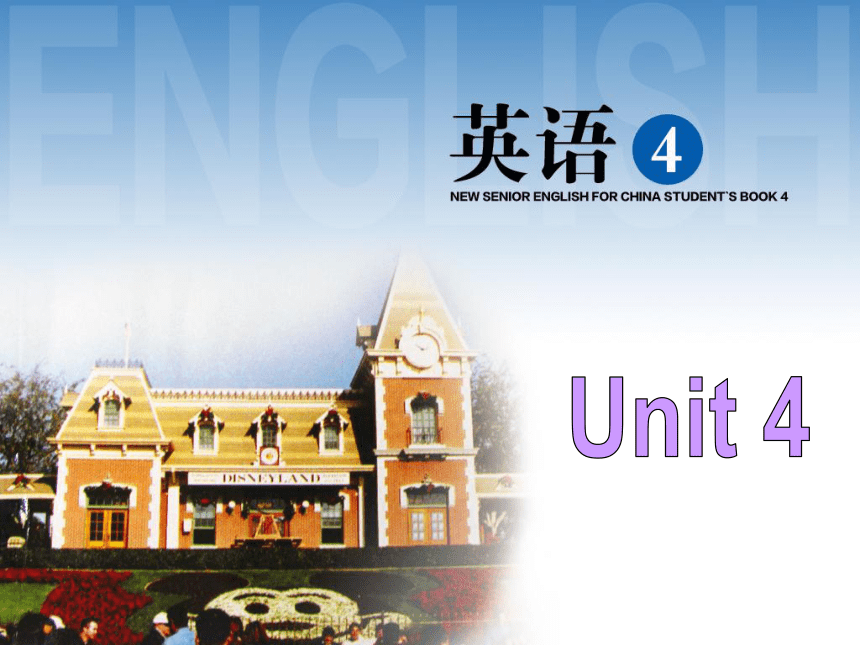
|
|
| 格式 | pptx | ||
| 文件大小 | 1.7MB | ||
| 资源类型 | 教案 | ||
| 版本资源 | 人教版(新课程标准) | ||
| 科目 | 英语 | ||
| 更新时间 | 2020-11-18 10:24:06 | ||
图片预览


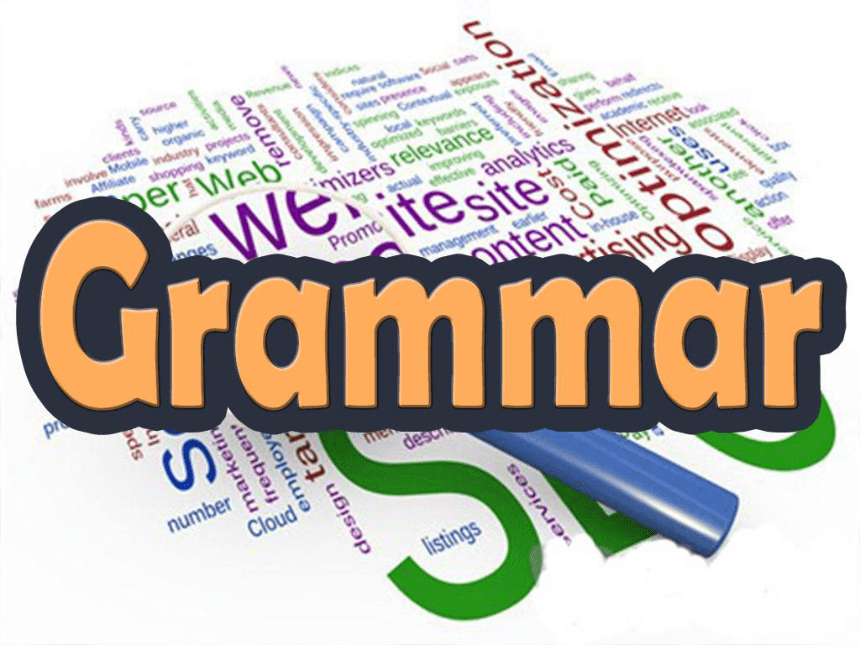
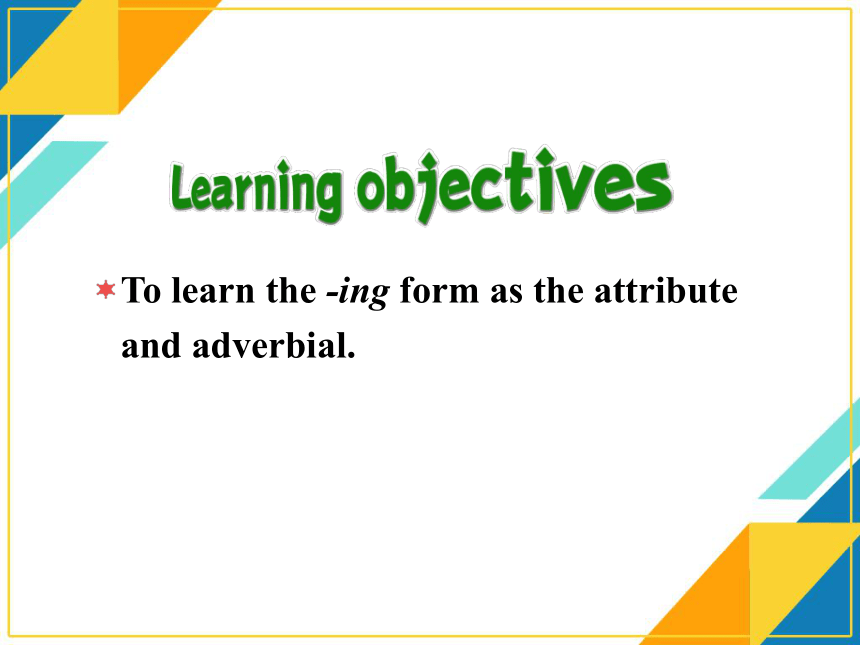
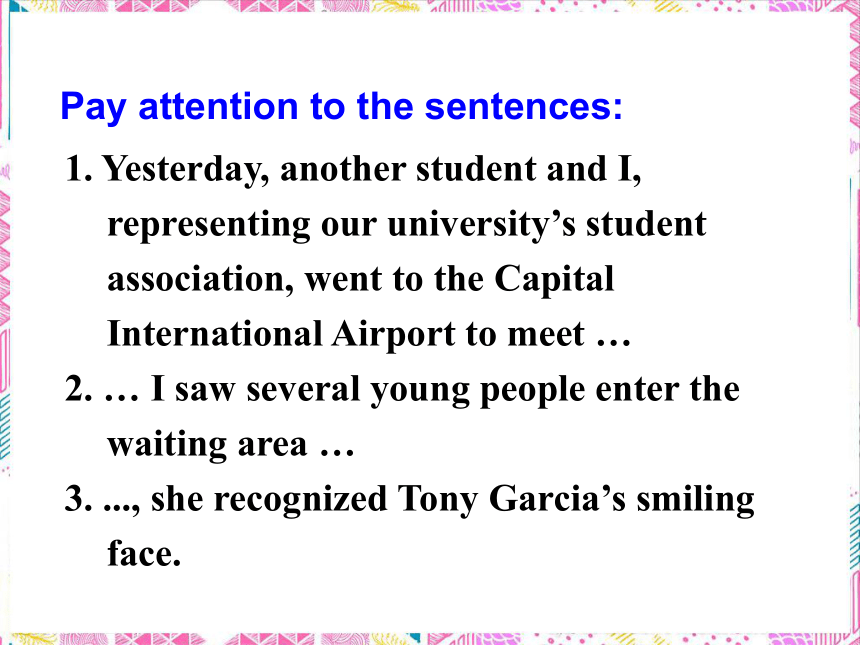
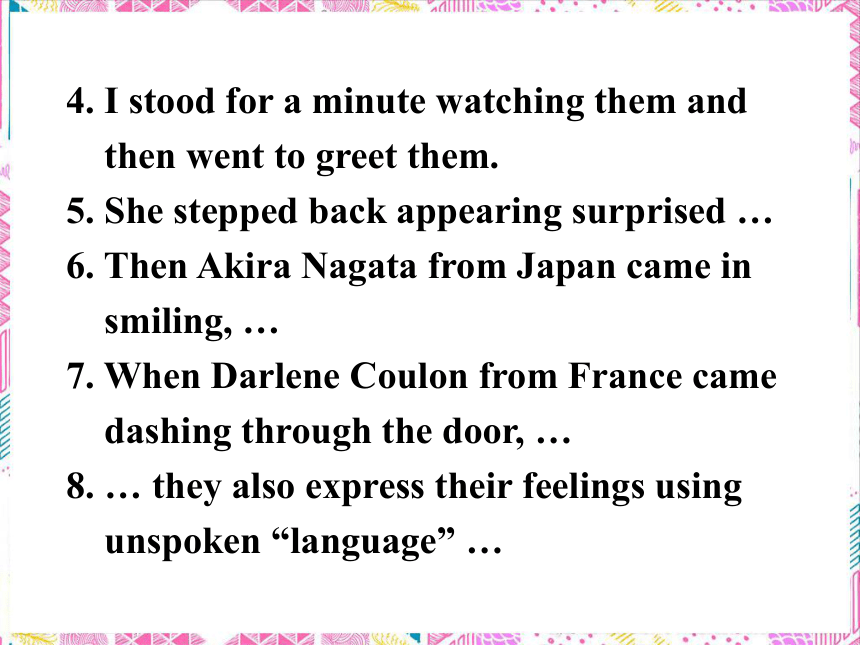

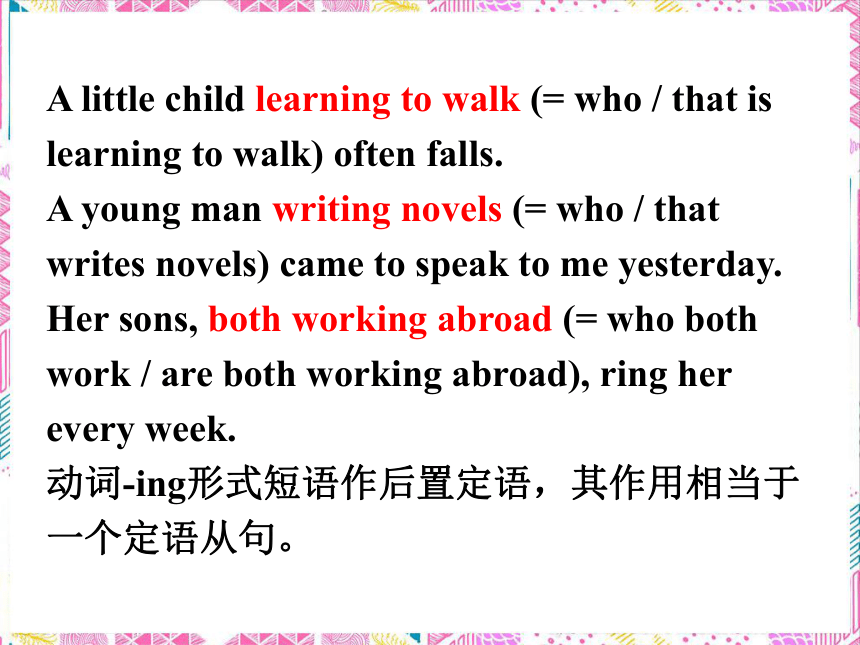
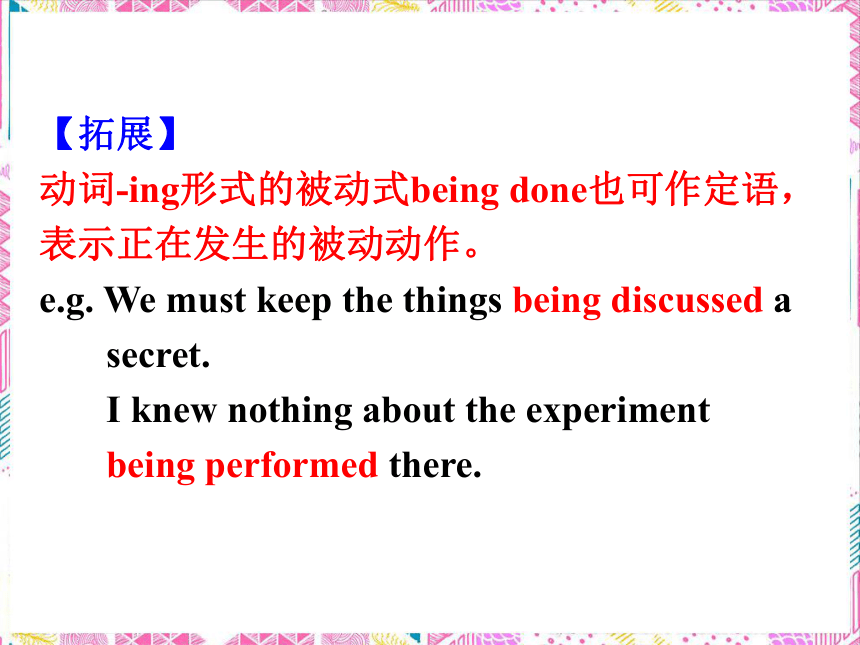

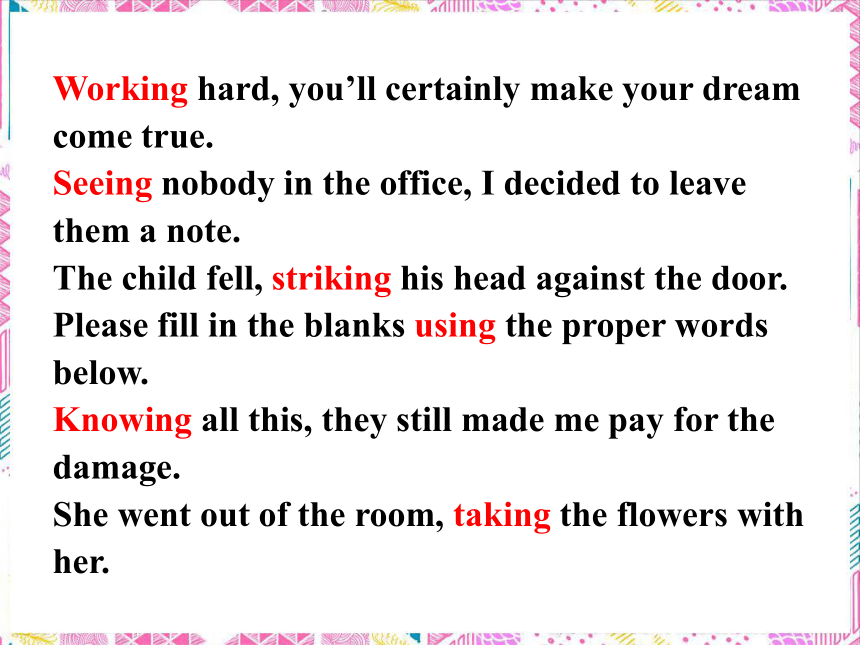
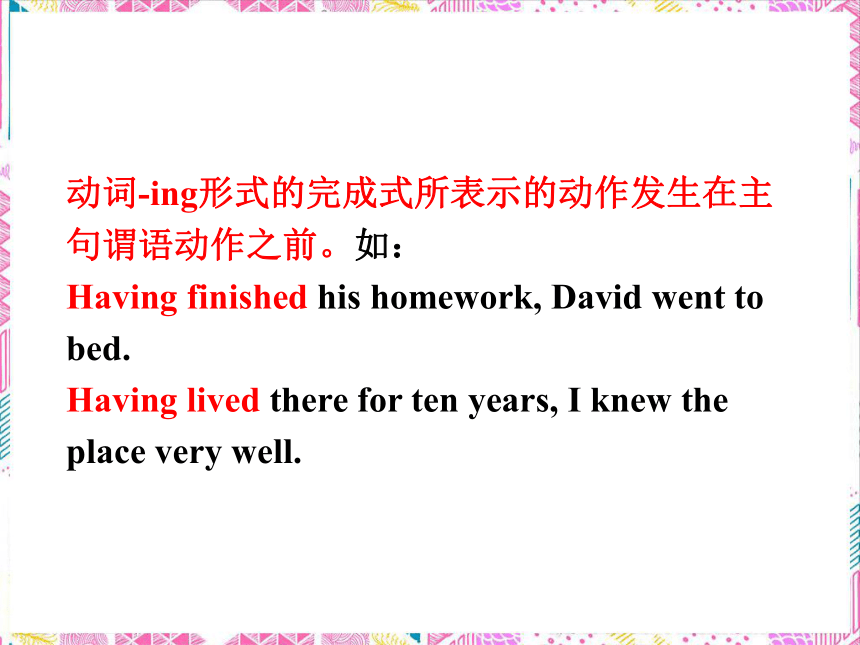
文档简介
Unit 4
Unit 4
Body language
To learn the -ing form as the attribute and adverbial.
1. Yesterday, another student and I, representing our university’s student association, went to the Capital International Airport to meet …
2. … I saw several young people enter the waiting area …
3. ..., she recognized Tony Garcia’s smiling face.
Pay attention to the sentences:
4. I stood for a minute watching them and
then went to greet them.
5. She stepped back appearing surprised …
6. Then Akira Nagata from Japan came in
smiling, …
7. When Darlene Coulon from France came
dashing through the door, …
8. … they also express their feelings using
unspoken “language” …
1. 作定语
The experiment was an amazing success.
You can find Vivien in the reading room.
There were growing doubts about the victory statement.
单个的动词-ing形式作定语常位于被修饰名词的前面,既可表示被修饰成分的性质或用途,也可表示被修饰成分的动作或状态。
动词-ing形式作定语和状语
A little child learning to walk (= who / that is learning to walk) often falls.
A young man writing novels (= who / that writes novels) came to speak to me yesterday.
Her sons, both working abroad (= who both work / are both working abroad), ring her every week.
动词-ing形式短语作后置定语,其作用相当于一个定语从句。
【拓展】
动词-ing形式的被动式being done也可作定语,
表示正在发生的被动动作。
e.g. We must keep the things being discussed a secret.
I knew nothing about the experiment
being performed there.
可表示时间、条件、原因、结果、方式、让步或伴随情况等,其逻辑主语通常与句子的主语一致,动词-ing形式所表示的动作与主语之间构成逻辑上的主谓关系。如:
Hearing the news, students all jumped with joy.
2. 作状语
Working hard, you’ll certainly make your dream come true.
Seeing nobody in the office, I decided to leave them a note.
The child fell, striking his head against the door.
Please fill in the blanks using the proper words below.
Knowing all this, they still made me pay for the damage.
She went out of the room, taking the flowers with her.
动词-ing形式的完成式所表示的动作发生在主句谓语动作之前。如:
Having finished his homework, David went to bed.
Having lived there for ten years, I knew the place very well.
动词-ing形式的否定形式常在其前面加not。
Not seeing Susan, I asked where she was.
Not having done it right, he tried again.
动词-ing形式作状语,其前往往可以加when, while, if, unless, once, though, as if等连词,构成“连词+动词-ing形式”结构。
John hurt his leg while playing football.
The woman stopped for a while as if waiting for a reply.
1. Mrs. Taylor went around the shops, ________ (order) what she thought was necessary. (天津)
ordering
2. Around 13,500 new jobs were created during the period, ________ (exceed) the expected number of12,000 held by market analysts. (江苏)
exceeding
3. The hospital has recently obtained new medical equipment, ________ (allow) more patients to be treated. (天津)
4. Many Chinese brands, _______________ (develop) their reputations over centuries, are facing new challenges from the modern market. (江苏)
allowing
having developed
5. Newly-built wooden cottages line the street, ________ (turn) the old town into a dreamland. (北京)
6. The cooling win swept through our bedroom windows, ________ (make) air conditioning unnecessary. (天津)
turning
making
e.g. Time permitting, I will pay a visit
to the whole city.
分词的逻辑主语是time, 而句子的主语是I, 两者不构成主谓关系, 所以只能用独立主格结构, 也就是给现在分词补充一个主语。
Attention
e.g. I waiting for the bus, a bird fell on my head. 我等汽车时,一只鸟落到我头上。
All the tickets having been sold out, they went away disappointedly.
所有的票已经卖光了,他们失望地离开了。
有时也可用with (without)+名词(代词宾格)+分词形式:
e.g. With the lights burning, he fell asleep.
他点着灯睡着了。
Use the –ing forms of the verbs below to complete the following sentences. Some verbs will be used more than once.
laugh, compete, smile, touch, approach, shake
1 We were all nervous about the
_____________ examinations.
2 I always know when my mother is
telling a joke. After a few seconds, she
always looks at me __________________.
approaching
laughing / smiling
3 Business leaders often look very serious.
They do not often have _______ faces.
4 After the dog fell in the lake, it climbed
out _______ itself.
5 The _______ buildings showed us that
an earthquake was coming.
6 After we saw the comedy show, we left
the theatre __________.
smiling
shaking
shaking
laughing
laugh, compete, smile, touch, approach, shake
7 It is exciting to watch _________
athletes reach the other end of the
swimming pool.
8 The blind man walked _________ the
walls of the buildings.
touching
competing
laugh, compete, smile, touch, approach, shake
1. When he approached Ms Smith, he
touched her shoulder and kissed her.
___________ ___________ Ms Smith, he
touched her shoulder and kissed her.
Rewrite the following sentences.
When
approaching
2. The person who is translating the songs
can speak seven languages.
The person __________ __________
__________ can speak seven languages.
translating
the
songs
3. The boy standing there is reading a
book about body language.
The boy ________ ________ ________
there is reading a book about body
language.
who
is
standing
4. Because he didn’t know anyone, he
stood there silently.
________ ________ anyone, he stood
there silently.
Not knowing
1. Having not seen the film, I can’t tell you what I think of it.
2. The men worked for extra hours got an extra pay.
3. Seen from the top of the hill, we find the city more beautiful.
4. Generally speak, facial expressions are helpful communications, too.
Not having
working
Seeing
speaking
Ⅲ. Correct the following sentences.
5. “Can’t you read?” the man said, angrily pointed to the notice on the wall.
6. Knocking at the door before entering, please.
7. European football is played in 80 countries, made it the most popular sport in the world.
pointing
Knock
making
Work in groups of four. Add more actions to these lists. Then combine the primary and secondary actions to make a sentence about a student in your group. That student must act out what you say.
Primary actions
Secondary actions
walk around the desk
look for an eraser
pick up a textbook
sit on the desk
frown (deeply)
jump (on one foot)
smile (in a crazy way)
shake (his/her head)
A: Cheng Hui walks around the desk jumping on one foot.
B: The frowning girl, Wang Jing, picked up her English book and threw it on the floor.
C: …
I. 用适当的介词填空。
1. Hearing the news, she went to the office ________ a hurry.
2. It became impossible to defend the base ___________ attack.
3. One should dare to ask ________ help when he meets difficulties.
in
against/from
for
II. 用括号内动词的正确形式填空。
1. They lived in a room ________ (face) the street. No wonder they always said it was too noisy.
2. It rained heavily in the south, ________ (cause) serious flooding in several provinces.
3. The traffic rule says young children under the age of four and ________ (weigh) less than 40 pounds must be in a child safety seat.
4. The lady walked around the shops, ________ (keep) an eye out for bargains.
facing
causing
weighing
keeping
5. Group activities will be organized after class ________ (help) children develop team spirit.
6. He got up late and hurried to his office, ________ (leave) the breakfast untouched.
7. John has really got the job because he showed me the official letter ________ (offer) him it.
8. When I was little, my mother used to sit by my bed, ________ (tell) me stories till I fell asleep.
to help
leaving
offering
telling
Ⅲ. 用括号内单词正确形式完成短文。
I just had a(n) 1. _________ (interest) journey to Chengdu with my parents. Before 2. ________ (leave), we made some plans. We searched the Internet, 3. ________ (learn) that Chengdu is a city with many places of interest. Then we made a reservation (预约) with a travel agency so that a guide could show us around.
interesting
leaving
learning
We were warmly greeted by our guide when 4. ________ (arrive) at the airport. Then, we started our trip. 5. ________ (follow) the guide, we first went to Chengdu Giant Panda Breeding Base, where we saw a lot of pandas and other 6. ________ (amuse) animals. The most 7. ________ (excite) thing was that we had the chance to touch cute panda babies and take pictures with them.
arriving
Following
amusing
exciting
What’s more, our guide 8. ________ (live) in Chengdu for so many years took us to enjoy some delicious local food such as Chengdu Hot Pot, Kung Pao chicken and Mapo Doufu. No wonder everyone 9. ________ (come) to Chengdu never wants to leave.
living
coming
Finish Exercises 1-3 on page 64.
Try to make at least 5 sentences by using the grammar.
Unit 4
Body language
To learn the -ing form as the attribute and adverbial.
1. Yesterday, another student and I, representing our university’s student association, went to the Capital International Airport to meet …
2. … I saw several young people enter the waiting area …
3. ..., she recognized Tony Garcia’s smiling face.
Pay attention to the sentences:
4. I stood for a minute watching them and
then went to greet them.
5. She stepped back appearing surprised …
6. Then Akira Nagata from Japan came in
smiling, …
7. When Darlene Coulon from France came
dashing through the door, …
8. … they also express their feelings using
unspoken “language” …
1. 作定语
The experiment was an amazing success.
You can find Vivien in the reading room.
There were growing doubts about the victory statement.
单个的动词-ing形式作定语常位于被修饰名词的前面,既可表示被修饰成分的性质或用途,也可表示被修饰成分的动作或状态。
动词-ing形式作定语和状语
A little child learning to walk (= who / that is learning to walk) often falls.
A young man writing novels (= who / that writes novels) came to speak to me yesterday.
Her sons, both working abroad (= who both work / are both working abroad), ring her every week.
动词-ing形式短语作后置定语,其作用相当于一个定语从句。
【拓展】
动词-ing形式的被动式being done也可作定语,
表示正在发生的被动动作。
e.g. We must keep the things being discussed a secret.
I knew nothing about the experiment
being performed there.
可表示时间、条件、原因、结果、方式、让步或伴随情况等,其逻辑主语通常与句子的主语一致,动词-ing形式所表示的动作与主语之间构成逻辑上的主谓关系。如:
Hearing the news, students all jumped with joy.
2. 作状语
Working hard, you’ll certainly make your dream come true.
Seeing nobody in the office, I decided to leave them a note.
The child fell, striking his head against the door.
Please fill in the blanks using the proper words below.
Knowing all this, they still made me pay for the damage.
She went out of the room, taking the flowers with her.
动词-ing形式的完成式所表示的动作发生在主句谓语动作之前。如:
Having finished his homework, David went to bed.
Having lived there for ten years, I knew the place very well.
动词-ing形式的否定形式常在其前面加not。
Not seeing Susan, I asked where she was.
Not having done it right, he tried again.
动词-ing形式作状语,其前往往可以加when, while, if, unless, once, though, as if等连词,构成“连词+动词-ing形式”结构。
John hurt his leg while playing football.
The woman stopped for a while as if waiting for a reply.
1. Mrs. Taylor went around the shops, ________ (order) what she thought was necessary. (天津)
ordering
2. Around 13,500 new jobs were created during the period, ________ (exceed) the expected number of12,000 held by market analysts. (江苏)
exceeding
3. The hospital has recently obtained new medical equipment, ________ (allow) more patients to be treated. (天津)
4. Many Chinese brands, _______________ (develop) their reputations over centuries, are facing new challenges from the modern market. (江苏)
allowing
having developed
5. Newly-built wooden cottages line the street, ________ (turn) the old town into a dreamland. (北京)
6. The cooling win swept through our bedroom windows, ________ (make) air conditioning unnecessary. (天津)
turning
making
e.g. Time permitting, I will pay a visit
to the whole city.
分词的逻辑主语是time, 而句子的主语是I, 两者不构成主谓关系, 所以只能用独立主格结构, 也就是给现在分词补充一个主语。
Attention
e.g. I waiting for the bus, a bird fell on my head. 我等汽车时,一只鸟落到我头上。
All the tickets having been sold out, they went away disappointedly.
所有的票已经卖光了,他们失望地离开了。
有时也可用with (without)+名词(代词宾格)+分词形式:
e.g. With the lights burning, he fell asleep.
他点着灯睡着了。
Use the –ing forms of the verbs below to complete the following sentences. Some verbs will be used more than once.
laugh, compete, smile, touch, approach, shake
1 We were all nervous about the
_____________ examinations.
2 I always know when my mother is
telling a joke. After a few seconds, she
always looks at me __________________.
approaching
laughing / smiling
3 Business leaders often look very serious.
They do not often have _______ faces.
4 After the dog fell in the lake, it climbed
out _______ itself.
5 The _______ buildings showed us that
an earthquake was coming.
6 After we saw the comedy show, we left
the theatre __________.
smiling
shaking
shaking
laughing
laugh, compete, smile, touch, approach, shake
7 It is exciting to watch _________
athletes reach the other end of the
swimming pool.
8 The blind man walked _________ the
walls of the buildings.
touching
competing
laugh, compete, smile, touch, approach, shake
1. When he approached Ms Smith, he
touched her shoulder and kissed her.
___________ ___________ Ms Smith, he
touched her shoulder and kissed her.
Rewrite the following sentences.
When
approaching
2. The person who is translating the songs
can speak seven languages.
The person __________ __________
__________ can speak seven languages.
translating
the
songs
3. The boy standing there is reading a
book about body language.
The boy ________ ________ ________
there is reading a book about body
language.
who
is
standing
4. Because he didn’t know anyone, he
stood there silently.
________ ________ anyone, he stood
there silently.
Not knowing
1. Having not seen the film, I can’t tell you what I think of it.
2. The men worked for extra hours got an extra pay.
3. Seen from the top of the hill, we find the city more beautiful.
4. Generally speak, facial expressions are helpful communications, too.
Not having
working
Seeing
speaking
Ⅲ. Correct the following sentences.
5. “Can’t you read?” the man said, angrily pointed to the notice on the wall.
6. Knocking at the door before entering, please.
7. European football is played in 80 countries, made it the most popular sport in the world.
pointing
Knock
making
Work in groups of four. Add more actions to these lists. Then combine the primary and secondary actions to make a sentence about a student in your group. That student must act out what you say.
Primary actions
Secondary actions
walk around the desk
look for an eraser
pick up a textbook
sit on the desk
frown (deeply)
jump (on one foot)
smile (in a crazy way)
shake (his/her head)
A: Cheng Hui walks around the desk jumping on one foot.
B: The frowning girl, Wang Jing, picked up her English book and threw it on the floor.
C: …
I. 用适当的介词填空。
1. Hearing the news, she went to the office ________ a hurry.
2. It became impossible to defend the base ___________ attack.
3. One should dare to ask ________ help when he meets difficulties.
in
against/from
for
II. 用括号内动词的正确形式填空。
1. They lived in a room ________ (face) the street. No wonder they always said it was too noisy.
2. It rained heavily in the south, ________ (cause) serious flooding in several provinces.
3. The traffic rule says young children under the age of four and ________ (weigh) less than 40 pounds must be in a child safety seat.
4. The lady walked around the shops, ________ (keep) an eye out for bargains.
facing
causing
weighing
keeping
5. Group activities will be organized after class ________ (help) children develop team spirit.
6. He got up late and hurried to his office, ________ (leave) the breakfast untouched.
7. John has really got the job because he showed me the official letter ________ (offer) him it.
8. When I was little, my mother used to sit by my bed, ________ (tell) me stories till I fell asleep.
to help
leaving
offering
telling
Ⅲ. 用括号内单词正确形式完成短文。
I just had a(n) 1. _________ (interest) journey to Chengdu with my parents. Before 2. ________ (leave), we made some plans. We searched the Internet, 3. ________ (learn) that Chengdu is a city with many places of interest. Then we made a reservation (预约) with a travel agency so that a guide could show us around.
interesting
leaving
learning
We were warmly greeted by our guide when 4. ________ (arrive) at the airport. Then, we started our trip. 5. ________ (follow) the guide, we first went to Chengdu Giant Panda Breeding Base, where we saw a lot of pandas and other 6. ________ (amuse) animals. The most 7. ________ (excite) thing was that we had the chance to touch cute panda babies and take pictures with them.
arriving
Following
amusing
exciting
What’s more, our guide 8. ________ (live) in Chengdu for so many years took us to enjoy some delicious local food such as Chengdu Hot Pot, Kung Pao chicken and Mapo Doufu. No wonder everyone 9. ________ (come) to Chengdu never wants to leave.
living
coming
Finish Exercises 1-3 on page 64.
Try to make at least 5 sentences by using the grammar.
同课章节目录
